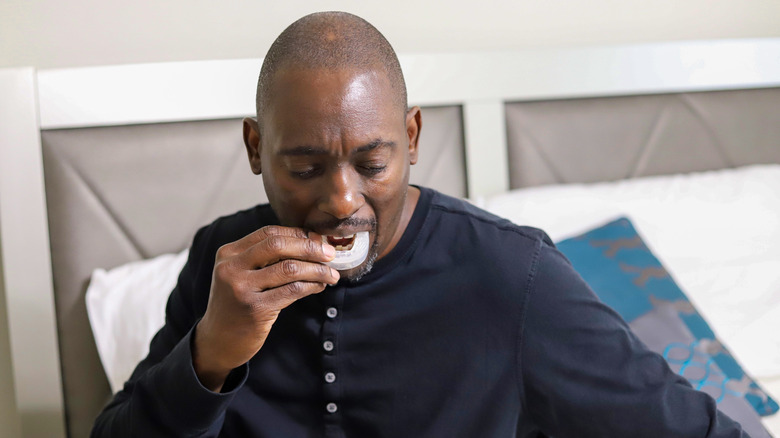Can Your Night Guard Cause Cavities?
If you want to have a good day, it's a good bet that you want to wake up fully rested. That's an easy enough goal for some. But if you grind your teeth, it might be easier said than done. It's even harder if you don't know that you grind your teeth, yet are still affected by the condition's symptoms.
A 2015 publication states that sleep bruxism affects roughly 8% of the adult population. It is most often diagnosed through a dental exam, and may be confirmed by a sleep study in which doctors monitor a person's jaw muscles while they're sleeping.
The same publication explains that bruxism is linked to a slew of symptoms, many of which can disrupt not only your sleep but your waking life as well. Bruxism can cause pain in your face, particularly around your jaw. It can also cause headaches and affect your breathing while you sleep.
One treatment is a night guard, according to Johns Hopkins. It's one of several treatment options and it is very common. A properly fitted night guard can prevent further damage to your teeth when worn in your sleep. That much, the experts agree on. But can night guards pose their own risk to your teeth even as they protect them from grinding damage?
Cavities don't have to be a risk
Pro Teeth Guard calls night guards the most common solution for nocturnal bruxism. When worn every night, they can protect your teeth from grinding damage. But as Pro Teeth Guard also points out, they can trigger several side effects. Some of these side effects aren't too concerning, like an increased tendency to drool.
But as Doctor of Dental Medicine Lance Collier writes on his site, many people are also concerned that night guards can cause cavities. And for good reason. Night guards are fitted tightly against a person's teeth. Any bacteria, plaque, or food particles trapped inside the guard are therefore kept close against the teeth as well. Over time this is the sort of thing that can lead to cavities.
Luckily, Dr. Collier goes on to explain that there are ways to reduce any risk night guards may pose. Properly cleaning your night guard every morning, using the technique recommended by your dentist, and then storing your night guard in its case during the day is a good front-line defense against any possible cavities.
Dr. Collier also recommends maintaining a good oral hygiene routine. The National Institute of Dental and Craniofacial Research states that both brushing and flossing are key components of a good oral hygiene routine. The Institute also suggests giving up cigarettes and drinking water with fluoride as ways to round out your dental care.


